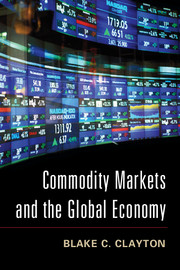Book contents
- Frontmatter
- Contents
- Foreword
- Acknowledgments
- 1 The Revenge of the Old Economy
- 2 A Twenty-First-Century Supercycle? Long-Term Trends in Metal and Energy Prices
- 3 Volatility in Global Food Markets
- 4 Commodity Markets and Financial Speculation
- 5 The Implications of Oil Prices for the U.S. Economy and Lessons Learned from the 2011 Strategic Petroleum Reserve Release
- 6 The Gold Standard as an Alternative Monetary Regime
- 7 Conclusion
- Index
7 - Conclusion
Published online by Cambridge University Press: 05 October 2015
- Frontmatter
- Contents
- Foreword
- Acknowledgments
- 1 The Revenge of the Old Economy
- 2 A Twenty-First-Century Supercycle? Long-Term Trends in Metal and Energy Prices
- 3 Volatility in Global Food Markets
- 4 Commodity Markets and Financial Speculation
- 5 The Implications of Oil Prices for the U.S. Economy and Lessons Learned from the 2011 Strategic Petroleum Reserve Release
- 6 The Gold Standard as an Alternative Monetary Regime
- 7 Conclusion
- Index
Summary
Analyzing the future direction of the market requires understanding the four sets of opposing forces that define the global commodity trade: (1) net importing and net exporting countries, in search of economic gains; (2) sovereign states (and state-owned enterprises) and private-sector companies vying for competitive advantage; (3) international cooperation and nationalism as opposing means of addressing failures in resource markets; and (4) the physical and financial aspects of the modern commodity trade. These pairs of forces form the critical context in which the competition for relevancy among countries, companies, and consumers negotiate in the commodities marketplace for economic and political advantage will take place. They are the critical context in which the broad range of policy- and investment-related issues discussed in this book, from debates over speculators in commodities markets to mitigating harmful energy and food market volatility, will be settled.
The dive in crude oil prices in late 2014 underscores the potential for sudden reversals that are intrinsic to commodity markets – particularly to those like oil with long project lead-times – and their capacity for confounding even the best attempts by analysts to predict long-term price paths. Brent crude oil, trading at roughly $60 per barrel at year-end, appeared to many observers to be locked firmly in the $100 to $120 dollar range, where it had traded over the preceding three years, for the foreseeable future. And yet the suppositions that had formed the basis for such predictions – that the Saudis would put a floor under prices no lower than $90 per barrel to protect the fiscal feasibility of their social spending programs, that a still-recovering developed-world economy would sputter at prices above that range, and that an uptick in worldwide consumption should prices fall below that threshold would cause any dip below it to be short-lived and contain the seeds of its own undoing – now look feeble. Regardless of where one sits with regard to if and when prices will regain lost ground, it is clear that the relative tranquility that had marked commodities broadly since their rebound in 2009 to 2011 was a transitory state of affairs. We have not reached the end of oil market history. Volatility and structural shifts, difficult to detect far in advance, are still ahead, continue to define these markets.
- Type
- Chapter
- Information
- Commodity Markets and the Global Economy , pp. 191 - 192Publisher: Cambridge University PressPrint publication year: 2015



